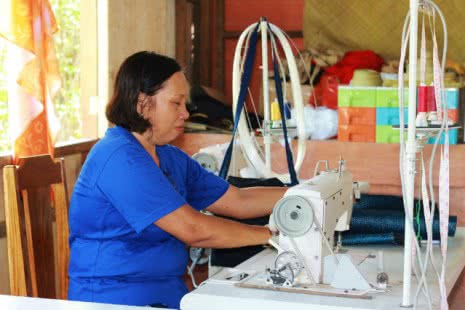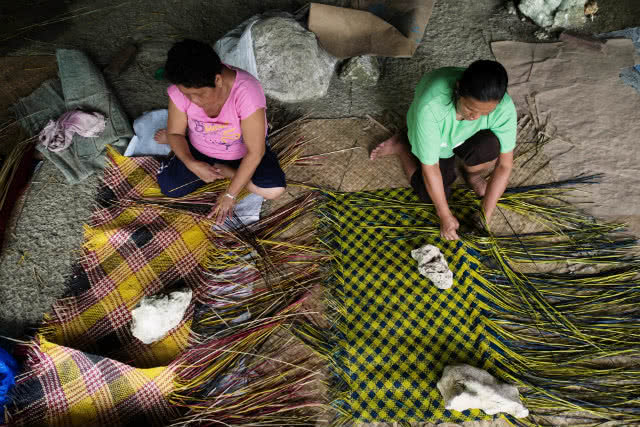“If women weavers are empowered to negotiate and market, they will be able to get more income”.
Women are at the forefront of economic recovery, after the Super Typhoon Yolanda (Haiyan) hit the town of Basey in The Philippines.
The town of Basey in the Philippines is known for its colourful and unique “tikog” (native reed) handicrafts.
Tikog stems are gathered and bleached under the sun for several days to dry out. The weavers use these to make intricate mats, bags, pouches, storage boxes and other crafts. Most of the laborious activities to produce these handicrafts are done by women.
Basey was one of the most heavily affected areas by Super Typhoon Yolanda (Haiyan) in December 2013. The town is located near the sea and is at a high-level risk of storm surges and flash flooding.
Yolanda had a significant impact on the tikog handicraft production as Basey was flooded with salt water from the sea. This destroyed the native reed from growing in the wild, and the salted soil was not suitable for immediate farming. In addition to this most of the homes, materials and work areas used for mat weaving were lost or badly damaged.
Since May 2015, CARE has supported 13 local women’s handicraft associations in the area. CARE has provided financial assistance and training on productivity, business planning, and marketing for the women involved in handicraft making.
“It was a big challenge for all women weavers of Basey to continue their interrupted livelihood activities. Most of them lost their houses because of Haiyan and had to rebuild from what was left and given by humanitarian organizations. Some children were also forced to stop schooling because their parents lack money,” said Anita Ogrimen who leads the Basey Association for Native Industry Growth (BANIG).
Anita sees the burden being carried by the women weavers. A weaver usually finishes a family-size tikog mat in 3 days but is only able to sell it at a low price.
“Some private traders are buying the finished products at a very low price. And these traders are selling the handicrafts double or triple the original price in Manila or somewhere,” she disclosed. “Obviously, the women are deprived of what they truly deserve.”
Anita believes that if these women weavers are empowered to negotiate and market, they will be able to get more income.
The weavers’ husbands take part in activities that require physical strength such as plowing and land preparation for tikog farming. The processing of the native reeds which requires bundling, counting the strands, drying, dividing by colour and size, weaving, mat embroidering, and marketing are completed by the women weavers.
A day in the life of a woman weaver

The women’s working hours are long from 10-14 hours a day on the average. The responsibility and labour of producing the mats and related products rests upon the women.
The women typically wake up at 4am in the morning to start weaving. They do this for a couple of hours, whilst start preparing their families breakfast. After this, the women then feed their families, do household chores and prepare their children for school. By mid-morning, the women continue the mat weaving until midday when they start preparing for lunch.
In the afternoon, the women continue their weaving work. If the women have older children to help with the household chores and dinner preparations, then she can continue uninterrupted otherwise she would have to stop her work.
In the evening once the family are asleep, the women continue weaving for as long as they can physically can. This is especially true if there are orders to deliver, or catch up on.
Disaster-resilient economy
CARE aims to help the BANIG and the rest of women associations to develop a competitive tikog industry to help uplift their status from marginalized workers into highly skilled and enterprising beneficiaries. This is for the economic growth of these disaster-resilient communities in an ecologically balanced environment.
CARE and BANIG will be establishing production areas in Basey to ensure a steady supply of the raw material requirement of the industry. A rehabilitation of a display area will be done to serve as a promotion and market outlet of the products to support Basey’s tourism industry.
Product diversification is also being promoted to the weavers. CARE will be conducting skills upgrading training to also try maximizing the use of other native materials such as rattan and buri.
“We are also looking forward to improve the quality of our products. We are now participating in various marketing events and trade fairs in the region and in Manila,” said Anita.
Anita said that the idea of boosting the industry through the support of various stakeholders drives the women weavers to produce high-quality products.
“Our vision is to penetrate the international market as well. Though for most weavers it is too ambitious, I told them that nothing is impossible if we will all work hard for it,” said Anita.
This article has been amended from the original publication on Rappler.

